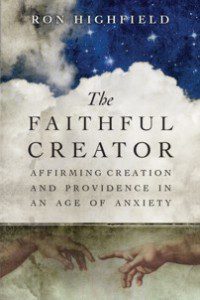Before delving more completely into how God creates, Ron Highfield in The Faithful Creator first looks at the nature of God. The theology he develops is what he terms the “traditional” view espoused by “traditional Christian theologians.” I have to admit that this terminology turns me off. It may be a conventional terminology in theology, but it removes the onus of argument from Highfield … this is not just a traditional view it is The Traditional View. The implication, at least to my ear, is that the student and reader should realize that this is The Correct View against which everything else is tested and falls short. Now I expect an author to believe that he or she is arguing for the correct view (I do so myself of course) – but I do want the author to make the effort to convince.
 The other problem with this terminology is that it minimizes the diversity of views expressed by faithful Christian thinkers throughout church history, from the first century onward. There is a pretty uniform Traditional View contained in the creeds “We believe in one God, the Father Almighty, Maker of heaven and earth, and of all things visible and invisible.” And many of the attributes of God that Highfield describes are traditional … “The triune God is one, simple, spiritual, eternal, independent, immortal, immutable, incomprehensible, ineffable, impassible, omnipotent, omnipresent, omniscient, and glorious, but also triune, loving, merciful, just, wise, and patient.” (p. 58) But it isn’t clear that they have always been developed the way that Highfield describes. It is easy to see streams of thought concerning these terms, but there are, and it appears always have been, different channels as finite humans interact with the reality of the divine, something beyond our understanding and experience. (Mississippi river delta, Image credit)
The other problem with this terminology is that it minimizes the diversity of views expressed by faithful Christian thinkers throughout church history, from the first century onward. There is a pretty uniform Traditional View contained in the creeds “We believe in one God, the Father Almighty, Maker of heaven and earth, and of all things visible and invisible.” And many of the attributes of God that Highfield describes are traditional … “The triune God is one, simple, spiritual, eternal, independent, immortal, immutable, incomprehensible, ineffable, impassible, omnipotent, omnipresent, omniscient, and glorious, but also triune, loving, merciful, just, wise, and patient.” (p. 58) But it isn’t clear that they have always been developed the way that Highfield describes. It is easy to see streams of thought concerning these terms, but there are, and it appears always have been, different channels as finite humans interact with the reality of the divine, something beyond our understanding and experience. (Mississippi river delta, Image credit)
But … we do well here to take the advice of Terrance Tiessen in his blurb for the book and benefit from interacting with Highfield’s “superb restatement of the tradition and his own constructive appropriation of it” … both where we agree and where we disagree.
The Creator God. Chapter three of The Faithful Creator presents what strikes me as the philosopher’s God – a statement I’ll explain further down. To begin:
Central to the traditional doctrine of God is the doxological principle that we ought to speak of God as unsurpassable in greatness and that we ought never think or speak of God in a way that indicates imperfection. (p. 59)
No argument here, but the specifics drawn out of this statement could be a different story. Highfield highlights four specific attributes of God to illustrate the importance of the traditional view in a doctrine of creation before moving on to look at creation and the trinity and divine freedom.
Simplicity. Divine simplicity is important because “composition is a mark of imperfection.” (p. 59) Highfield makes no bones about the importance he attaches to this point “the cost of denying God’s simplicity is God’s very deity.” (p. 60) Anything that is composite can fall apart – as water (my example, not Highfield’s) can decompose to hydrogen and oxygen, hydrogen to an electron and a proton, a proton is stable, composed of three quarks. (I guess the quarks and electron may be perfect.) God cannot decompose or be decomposed into parts.
One consequence of God’s simplicity is that we should not seek (and Highfield does not seek) a rational understanding of the mediation between God and the world.
Another consequence is that “we must think of all God’s actions as expressions of the whole divine being.”
Creation cannot be attributed to the Father alone, with reconciliation seen as a work of the Son alone and redemption given over exclusively to the Spirit. All God’s acts are acts of the whole Trinity. God’s acts of creation cannot be separated from his saving and redeeming actions. (p. 62)
Eternity. God isn’t just everlasting, but is entirely outside of time. This is the essence of his eternity.
To conceive of God as temporal, even if everlasting, would force us to think of God as always in the process of becoming, but never actually being God. … In contrast to imperfect creatures, the tradition views God as fully actual and simultaneously and wholly present and transparent to himself. (p. 63)
In this view to be temporal is intrinsically to be imperfect. Temporal implies change and change implies imperfection. Which brings us to the next attribute.
Immutability. God cannot and does not change. An immutable object is an object whose state can not be modified. Now immutability applied to God’s character, will, and covenant promises is a traditional doctrine that is well attested in scripture. But immutability as Highfield defines it goes further than this.
Since God is eternally perfect and fully actual there is no need and no possibility for God to change. Change implies imperfection, potentiality, and time, none of which applies to God. …
The tradition argues that God is eternally fully actual, which is doxologically optimal. For it allows us to praise God as the One in whom every possible good is infinitely actualized eternally. (p. 64-65)
And later:
In contrast to the caricature of the immutable God as cold, aloof, dead, unresponsive, static, the traditional doctrine understands God as unchangingly active and eternally fully alive. The term static applies only to something which could be active but is not. Those who defend immutability assert that God is pure act. (p. 66)
Omnipotence. “The traditional doctrine of divine omnipotence can be summed up in three theses: God is his power, God can do all things and God empowers all other powers.” (p. 67) God doesn’t derive his power from something or someone else. This is a non-controversial thesis and is key to theology whether one follows the “traditional” view or not. More than this, he doesn’t use, consume, or have power – He is power. That God can do all things is also non-controversial. This doesn’t mean that God can do the logically inconsistent. For example, he cannot make a square circle because square and circle are two different things. Finally, God as the one who empowers all other powers is an important concept to grasp. Among other things this means that God’s creative act did not end when the world was formed but is an ongoing activity. His power sustains every part of creation from beginning to end.
Highfield explicitly denies that God self-limits his power in any way in creation – a topic that will come up again in later chapters.
The Trinity and Creation. The doctrine of the Trinity “teaches us to view God through the lens of the life, work, character, death, and resurrection of Christ.” (p. 71) A Christian doctrine of creation must be thoroughly christocentric. “Just as creation came through Christ, salvation occurs in Christ. Christ is the end and meaning of creation.”
And finally, Divine Freedom. God was under no compulsion to create the world. He didn’t and doesn’t need the world. Highfield quotes David Fergusson from Creation.
Though God is free and uncompelled we should not think of God’s act of creation as arbitrary, whimsical or experimental, because there is nothing in God’s being arbitrary or accidental to serve as a foundation for a capricious act. David Fergusson’s words hit the mark: “There is no natural necessity in the creation of the world. Nothing within the divine being requires that the world come into existence or implies that it must possess a particular form. As a free act, creation is gratuitous. God does not need to make the world; its appearance is itself a sheer act of divine grace.”
Summary Comments . I said above that it appears to me that Highfield describes a philosopher’s God. With the exception of the relationship between Christ and creation (which is thoroughly biblical), much of this description is compelled by a philosopher’s definition of doxological perfection. It isn’t really grounded in God’s self revelation to his people contained in Scripture. I agree with many of Highfield’s points – God is omniscient, omnipotent, omnipresent, eternal. But others are strained. For example, I don’t think that there is logical stream that demands that temporal implies change and change implies imperfection. This is an assertion based on an external definition of perfection.
. I said above that it appears to me that Highfield describes a philosopher’s God. With the exception of the relationship between Christ and creation (which is thoroughly biblical), much of this description is compelled by a philosopher’s definition of doxological perfection. It isn’t really grounded in God’s self revelation to his people contained in Scripture. I agree with many of Highfield’s points – God is omniscient, omnipotent, omnipresent, eternal. But others are strained. For example, I don’t think that there is logical stream that demands that temporal implies change and change implies imperfection. This is an assertion based on an external definition of perfection.
There also seems to be a misconception of both time and temporal. Not withstanding all of the time travel movies we’ve seen, time is defined by action. It isn’t some external reality within which we move. (If a physicist wishes to contest this, I’m willing to listen.) Because of this, I think that to say that God is pure act without being temporal is a logical inconsistency on par with creating a square circle. God’s actions define God’s time. Because he acts he is temporal. This shouldn’t be viewed as an imperfection. And God doesn’t change his character, will, or promises. As God is power, perhaps also God is time.
The statement of divine freedom is also a philosophical position. Frankly I think we have no way of knowing whether God in some way “needed” to make the world or not. Perhaps creating is part of the essence of his being. Who are we, mere mortals, to state authoritatively otherwise? All we really know is that God did create and we trust that he had and has an ongoing reason for doing so. There is a plan, purpose, and consummation of creation in new creation.
Do you agree with Highfield’s description of God?
If not, where do you disagree?
What does it mean to say that God is eternal? Does temporal imply change imply imperfection?
If you wish to contact me directly you may do so at rjs4mail[at]att.net.
If interested you can subscribe to a full text feed of my posts at Musings on Science and Theology.











